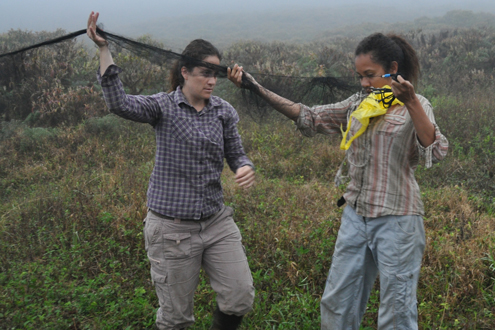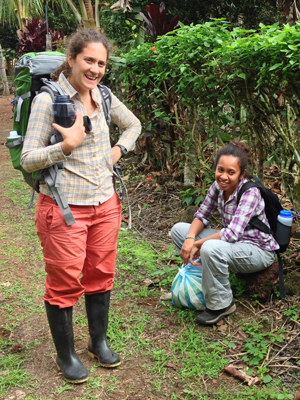
UMSL graduate students Mari Cruz Jaramillo (left) and Samoa Asigau work together in the field in the Galapagos Islands. (Photo by Véronique LaCapra, St. Louis Public Radio)
Two University of Missouri–St. Louis graduate students spent the summer conducting fieldwork in the Galapagos Islands – a kind of mecca for biologists because of the endemic species that have evolved to adapt to the islands’ unique environments.
Mari Cruz Jaramillo and Samoa Asigau traveled the approximately 2,700 miles to study various aspects of avian malaria. The students along with other scientists are trying to gauge the threat the disease poses to native bird species.

UMSL graduate students Mari Cruz Jaramillo (standing) and Samoa Asigau spent the summer conducting research on the Galapagos Islands. (Photo by Véronique LaCapra, St. Louis Public Radio)
“Ever since I knew I wanted to be a biologist, I wanted to come to the Galapagos Islands. That was my goal,” Jaramillo told St. Louis Public Radio | 90.7 KWMU science reporter Véronique LaCapra, who met up with the students in the Galapagos courtesy of a Public Radio Exchange (PRX) competition that funded the trip with support from the Alfred P. Sloan Foundation.
The outcome of her journey is reflected in her recent radio feature “Two Young Women Scientists from UMSL Forge Their Futures in the Galapagos.”
Once both women receive their doctorates from UMSL they plan on returning to their home countries to continue their research and inspire a new generation of female scientists.
“If I can come from a country like Papua New Guinea, come and do research in a place like Galapagos, and study at an institution like my university, then you can do it too,” Asigau said.
To listen to the entire radio feature visit the St. Louis Public Radio website.














